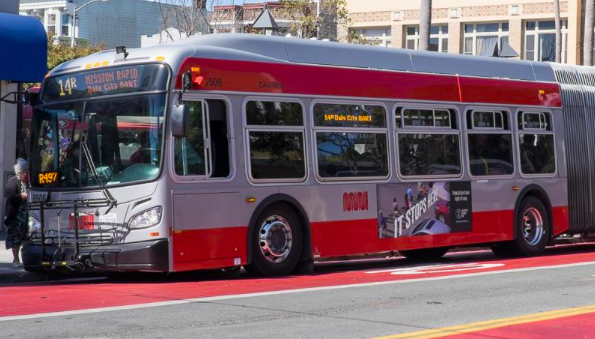Mayor Daniel Lurie is damaging democracy, the environment, and public transit in San Francisco, and very few people seem to have noticed. How is he doing this? By undoing Better Market Street through his decision to welcome Waymo, and Uber and Lyft Blacks, onto Market Street between 10th and Steuart Streets.
At the same time, the San Francisco Municipal Transportation Agency, faced with a looming $320 million budget shortfall, is starting to reduce service: the 5-Fulton, the new 6-Hayes/Parnassus, the 31-Balboa, and the 9-San Bruno, now turn around when they reach Market Street, forcing passengers going farther to transfer.

Lurie’s invitation amounts to the privatization of transit for private gain at the expense of the general public. And you can be sure that Waymo, Uber, and Lyft are just the first private, for-profit services that want access to Market Street—Tesla, Amazon’s Zoox, and other companies are sure to follow.
Better Market Street is a set of road diets approved by the SFMTA Board of Directors in October 2019 and implemented in January 2020. Prior to approval, the program underwent years of planning, environmental review, and public outreach. A major aspect of BMS has been the elimination of private cars. The purpose? To make downtown Market Street safer for pedestrians and bicyclists and to speed up Muni service. As the city has recovered from the pandemic, statistics indicate the improvements are working.
However, Lurie is making his decision to undo Better Market Street unilaterally and without environmental review.
This is not how it’s supposed to work, and that’s according to the will of the voters: our charter, our Transit First Policy, and the 2007 Proposition A.
Proposition A, which passed with 55 percent of the vote, gave more power to the members of the SFMTA Board of Directors in order “to increase the efficiency, effectiveness and autonomy of the Municipal Transportation Agency and to reduce greenhouse gas emissions from San Francisco’s transportation sector.” Also, one of the arguments for Proposition A in the Voter Information Pamphlet was: “keep Muni free from excessive political interference.”
Members of the Keep Market Street Moving coalition oppose the subversion of Better Market Street and have created a petition and a letter for people to sign and send. They are also planning to attend the September 2, 2025 Board of Directors meeting and give public testimony. That meeting takes place in Room 400 of City Hall at 1 p.m.
Lurie’s invitation to Waymo, Uber, and Lyft will be part of Director Julie Kirchbaum’s report to the Board of Directors—but it is not an action item, as it should be. The KMSM coalition members who will attend plan to remind the directors that Market Street is under their purview—not that of the mayor.
There are other reasons why Lurie’s invitation is so bad. We are in a climate emergency, and these private, for-profit vehicles are doing the one thing transportation experts are telling us not to do— adding vehicle miles traveled. They also exacerbate congestion and compete with Muni for passengers, even though Muni is our best tool for reducing our transportation-related greenhouse gas emissions.
Moreover, state government and the California Public Utilities Commission have greenlit Uber, Lyft, and Waymo without requiring environmental review. Many of these decisions to grease the wheels for these private, for-profit transportation businesses have been made by Democrats—US Senator Alex Padilla, as a state senator, was the sponsor of legislation greenlighting autonomous vehicles without requiring a review of their environmental impacts. All five current members of the California Public Utilities Commission—the agency responsible for the regulation of Ubers, Lyfts, and commercial AVs—are appointees of Governor Gavin Newsom, and the one commissioner who voted against the authorization of commercial AV operations in August 2023, Genevieve Shiroma, though a Newsom appointee, quit in 2024. And while State Senator Dave Cortese (D-San Jose) introduced SB 915 to establish local regulatory authority over AVs, our own State Senator Scott Wiener voted against it. Cortese pulled the bill when it looked like Assembly members would not pass without being radically amended.
So is Daniel Lurie just another in a series of Democratic officeholders who feels more indebted to billionaires and their corporate interests? If so, collusion between these corporate Democrats and corporate interests does not bode well for the future of democracy or the planet.





